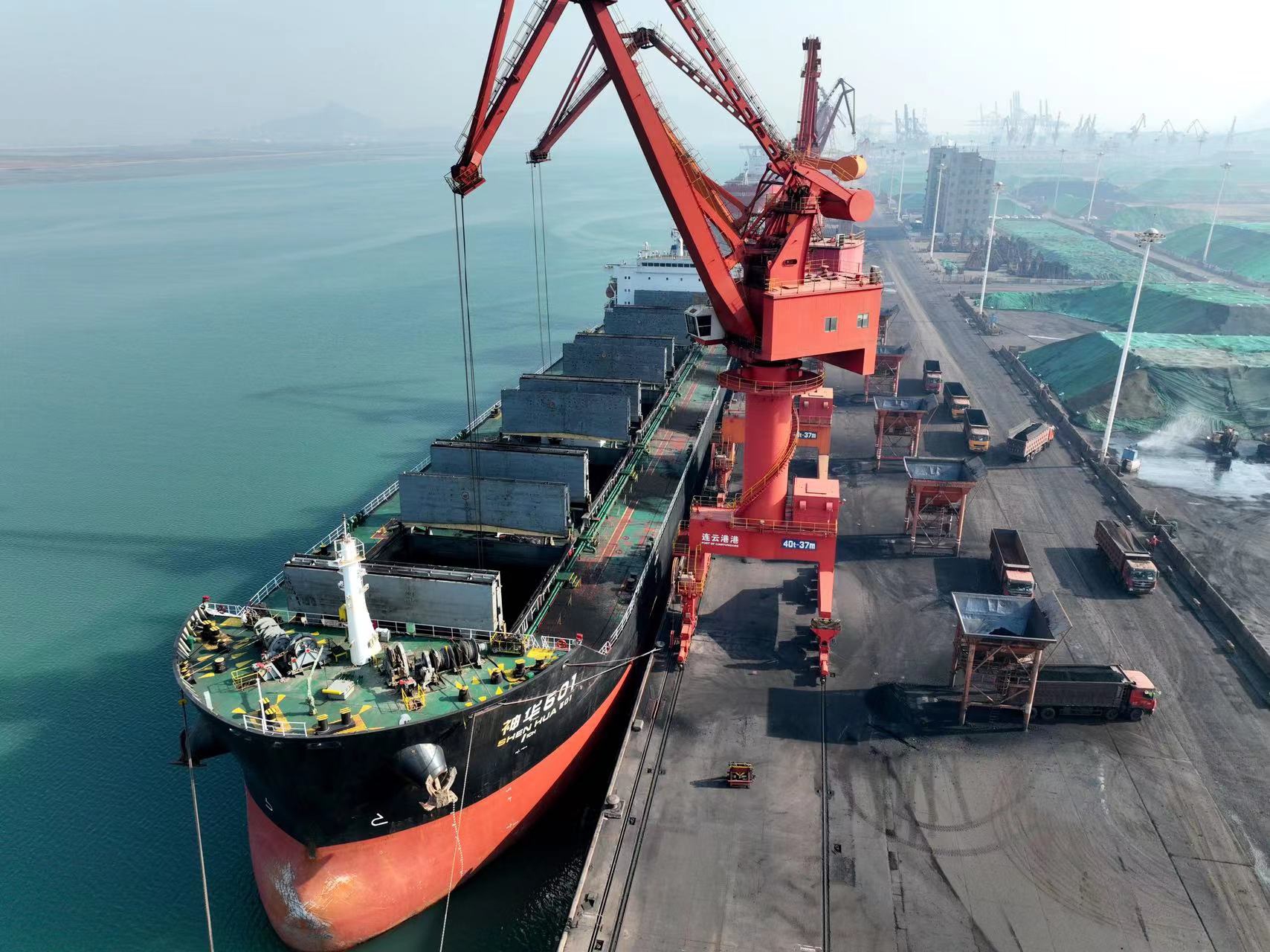
Tons of thermal coal are unloaded and transported at a port in Lianyungang, East China's Jiangsu Province on December 21, 2022. Photo: VCG
China-Australia trade relations have seen a continuous positive trend, with the first nine months witnessing a 10.2 percent year-on-year growth in trade volume, while the momentum has been quickly restored to business activities on both sides, an expert view as a promising indicator for the two major trading partners.
While traditional goods like coal and iron ore have been the driving force for such growth, other newly-resumed trading products such as barley, wood and cotton are injecting new impetus into trade growth, the Global Times learned from experts and industry insiders. Another product - Australian hay, or oat grass - is resuming trade to China.
From January to September, bilateral trade between China and Australia amounted to 1.197 trillion yuan ($160 billion), an increase of 10.2 percent, with both imports and exports seeing positive growth, data from the General Administration of Customs showed on Friday.
Among them, China's imports from Australia recorded a vigorous growth of 15.3 percent year-on-year, maintaining monthly double-digit growth since the beginning of this year.
The positive growth was driven by strong Australian goods such as iron ore and coal. Australia has remained the largest exporter of iron ore to China - a total of 729.32 million tons of Australian iron ore were imported in 2022, up 5.1 percent year-on-year, making up around 66 percent of total iron ore imports. Brazil held a 20.5 percent share, ranking second.
Trade in coal, another key good, is picking up fast, and may set a new record this year, the Global Times learned. Latest industry figures show that around 29.55 million tons of Australian coal were imported to China, with the monthly amount standing at around 6 million tons, according to data that domestic industry research platform Today Think Tank shared with the Global Times.
"It is highly expected that the amount of Australian coal to China will exceed the 50 million ton benchmark this year, putting Australia back in the top five for the first time since the resumption of trade early this year," Jia Na, an analyst from Today Think Tank, who has been closely following the Australian coal trade with China, told the Global Times on Friday.
Trade in others goods from Australia, including beef and barley, which recently recovered after the resumption of trade and the restoration of market confidence, is also picking up.
China is a major buyer of Australia produced barley.
Barley is one of the top three agricultural products that Australia exports to China, with about 70 percent of Australia's barley produce sold to China.
Moreover, Australian hay, another commodity that used to mainly rely on the Chinese market, has resumed trading, the Global Times learned from a document recently released by the General Administration of Customs (GAC) and an industry insider.
At least 23 Australian exporters are now able to export their corresponding products to China. Among them, the majority of Australian hay exporters have had their trade licenses for China extended until August 2028, the Global Times learned from a document released by the GAC.
A veteran trader based in Beijing, surnamed Wang, who has been involved in the hay-related business for many years, confirmed with the Global Times on Friday that the Australian oaten hay trade has resumed.
"While domestic companies no longer heavily rely on Australian products, it is still a good alternative that will help to improve and enhance the structure of China's animal feeding market, as well as stabilize domestic market prices," Wang said, noting that he is already signing new contracts for Australian hay imports with his business partners in Australia.
"The enduring trade relationship confirms the continuous upward trajectory of the two countries' ties, which not only signifies the recovery of bilateral trade but also demonstrates a steady increase and strong momentum," Chen Hong, president of the Chinese Association of Australian Studies, told the Global Times on Friday.
During the pandemic and the downturn in the overall bilateral relationship, China-Australia economic and trade ties still managed to maintain a certain level of resilience, and now, under the current circumstances, the relationship between the two countries is steadily improving. Chen said that this improvement is reflected in the recovery of Chinese consumers' preference and confidence in Australia, which is also reflected in the trade statistics.
The economic and trade relationship mirrors the ongoing warming of China-Australia relations, Chen said, noting that "in addition to traditional fields, potential for bilateral cooperation in new areas such as clean energy, the service industry, finance, and education is also unprecedented, and the future looks promising."
Recently,
Cheng Lei, an Australian national who had worked for a Chinese media outlet, was deported from China after serving a prison sentence of two years and 11 months for illegally providing state secrets to a foreign agency.
China's stance on China-Australia ties has been consistent, Chinese foreign ministry spokesperson Wang Wenbin said on Wednesday when asked by media if Cheng's case will help improve China-Australia ties.
Healthy and stable bilateral relations are in accordance with the interests of both countries and both peoples, as well as regional and global stability. China is willing to work with Australia to push for the continuous improvement of bilateral ties, Wang said.




